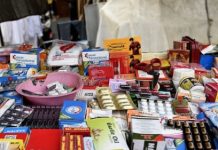
The National Primary Health Care Development Agency (NPHCDA) has rejected COVID-19 vaccine doses donated by Gavi, the Vaccine Alliance to Nigeria because the vaccines will expire in less than six months.
The Executive Director, NPHCDA, Dr. Faisal Shuaib, disclosed this on Tuesday in Abuja, while presenting a paper on “Status of COVID-19 Vaccine Roll-Out, Delivery, Uptake, Challenges, and Potential Areas Where Advocacy is Needed”.
The occasion is a two-day Strategic Advocacy Retreat on COVID-19 and Health Security in Nigeria.
He added that the country has a standard of rejecting vaccines with expiration dates of less than six months.
The News Agency of Nigeria reports that the two-day strategic retreat was organised by the Africa Health Budget Network, in collaboration with the National Advocates for Health, Nigerian Cancer Society, and relevant advocacy civil society organisations.
Dr. Shuaib, represented by the Director, Planning Research and Statistics at NPHCDA, Dr. Abdullahi Bulama Garba, said the development is to further demonstrate the agency’s high standards in its operations within the country.
“The work that we do is the work that requires trust. It is a sacred trust that has been bestowed on us by Nigerians and we hold that trust to be true.
“We pride in that trust very jealously. This is why we did not accept the vaccine doses that had less than six months to expiration. The vaccines from Gavi were five months to their expiration date, so we can’t take such vaccines because they did not meet the country’s standard,” he stressed.
He said that the agency was working with partners to ensure that the country vaccinates 50 per cent of the eligible population by March 2022; and 70 per cent by June 2022, noting that it was also working to deliver vaccines to the states.
“The Federal Government of Nigeria, through the NPHCDA, Federal Ministry of Health and partners, plans to achieve 50 per cent coverage of COVID-19 vaccination by the end of the first quarter of 2022; and vaccinate all eligible populations by end of 2022 to achieve herd immunity.
“Considering the high influx of vaccines expected in 2022, and the need to quickly protect the vulnerable population against COVID-19, the country has ramped-up COVID-19 vaccines uptake.
“The NPHCDA, working collaboratively with other Government MDAs and development partners, has deployed the S.C.A.L.E.S strategy to ensure that all COVID-19 vaccines received by the country are equitably distributed and efficiently used within the shortest time frame.
“The COVID-19 vaccination strategy team meets daily and has been proactive in taking immediate actions to ensure challenges are effectively mitigated. There is progressive improvement in the daily utilisation rates reporting, however, more is desired,” he explained.
He disclosed that over 62 million doses of COVID-19 vaccines have been received from various donors so far in the country, with 42 million expected to be received before the end of the second quarter of 2022.
“Total doses of COVID-19 vaccine received from March 2021 till date is 16,230,960.
“Description of Quantity Expected 41,847,880 doses. The federal government has received a commitment for the supply of 6,962,400 doses of Moderna vaccines from the US Government/COVAX.
“This is being expected within the next one week. The government has received a commitment for the donation of 2,407,600 doses of AstraZeneca /Covishield vaccines. This is being expected within the next two weeks.
“13,392,000 doses of Johnson and Johnson vaccines procured by the Federal government will be shipped before the end of February 2022, while an additional 23 million doses of the J&J vaccines will be shipped to Nigeria in batches in the next few months.
“10,089,600 doses of J&J vaccines donated by the COVAX facility will be shipped to Nigeria before the end of the first quarter of 2022.
“The 62,270,980 in the country were: 16,230,960 – Moderna, 19,482,240 – AstraZeneca, 10,980,400 – J&J, and 15,577,380 – Pfizer,” he stated.
Dr. Shuaib added that the incoming vaccines would come from COVAX or be procured by the government through the African Vaccine Acquisition Task Team and AfreximBank facility.
“The majority of the vaccines were donated by the COVAX facilities and the African Vaccine Acquisition Task Team (AVAT),” he added.
The NPHCDA said that strategic approaches to reduce hesitancy and increase uptake of the COVID-19 vaccine were targeted towards advocacy, intensive media engagement, and community engagement.
“Communication activities will focus on high impact interventions in three thematic areas to increase vaccine confidence and uptake in the subsequent phases of vaccination.
“Messaging will be centred on the ‘whole-of-family approach’,” emphasizing integrated health care service delivery at the vaccination site, Cascaded Town Hall meetings to secure community buy-in, Continuous evidence generation, including community polling, will guide all interventions,” he outlined.
According to him, NPHCDA, working with development partners, has developed a comprehensive multi-sectoral Communication Strategic Plan to increase COVID-19 vaccine uptake during the second phase of vaccination.
He added that the COVID-19 Crisis Communication Centre (CRICC) had been set up at the National, State and the Local Government Area levels to manage COVID-19. He added that CRICC is located at the National Polio Emergency Operations Centre (EOC).
“Membership will be multisectoral with most members drawn from the Technical Working Group of the Risk Communication and Demand Generation sub-committee.
Similar structures shall be set up at State and LGA levels, with CRICC, integrated within the Social Mobilization Committees at all levels, as a vehicle to drive real-time implementation, monitoring, tracking, reporting, and documentation of Advocacy Communication and Social Mobilisation (ACSM), at all levels.
“Special purpose vehicles will convey factual information on multimedia, service-based, and community platforms; promote behavioural change; debunk misinformation and rumours; track and address public sentiments and perceptions about COVID-19 vaccination; and build confidence, trust and demand for vaccine uptake,” he explained.
Shauib noted that the expected value addition from CRICC would be to strengthen the Social Mobilization Committee at all levels, and reduce duplication of roles and responsibilities among MDAs and partners, as human and financial resources are designed to work together.
Among others, he said, there were clear deliverables and timelines, with accountability for performance and non-performance of individuals and organizations, and rapid real-time tracking, reporting and documentation of rumours to aid interventions.
The NPHCDA boss noted that the goal of CRICC is to increase access to information on COVID-19 vaccines from 70 per cent to 90 per cent by the end of 2022 and improve confidence and trust in COVID-19 vaccines from 62 per cent to 80 per cent by the end of 2021.
In addition, it would expand the social listening framework to include community-based rumours tracking in real-time.
“CRICC works to bring together expertise from MDAs and partners such as the National Orientation Agency (NOA); Federal Ministry of Information, partners (CDDs, VCM, CORPS, etc), Traditional and Religious Leaders, Professional Groups and Trade Unions.
“It collaborates with existing networks which add value and bring on board, rapid analysis of data for decision making, rapid decision making and syndication to lower levels.
“It will provide intensive Public Information Management through interpersonal, regular, traditional and social media channels and rewards and sanctions mechanism critical resources,” he outlined.
(NAN)













